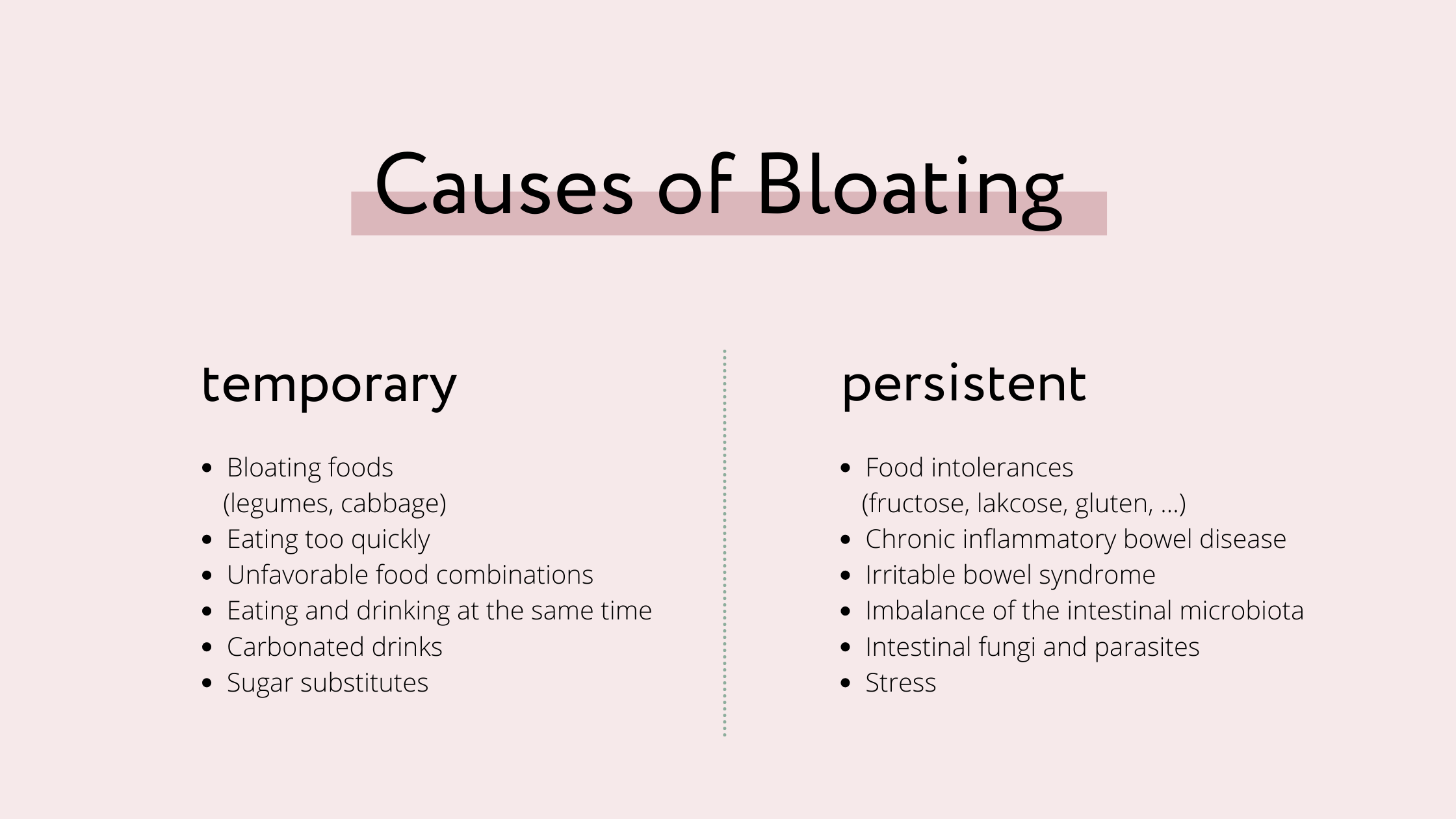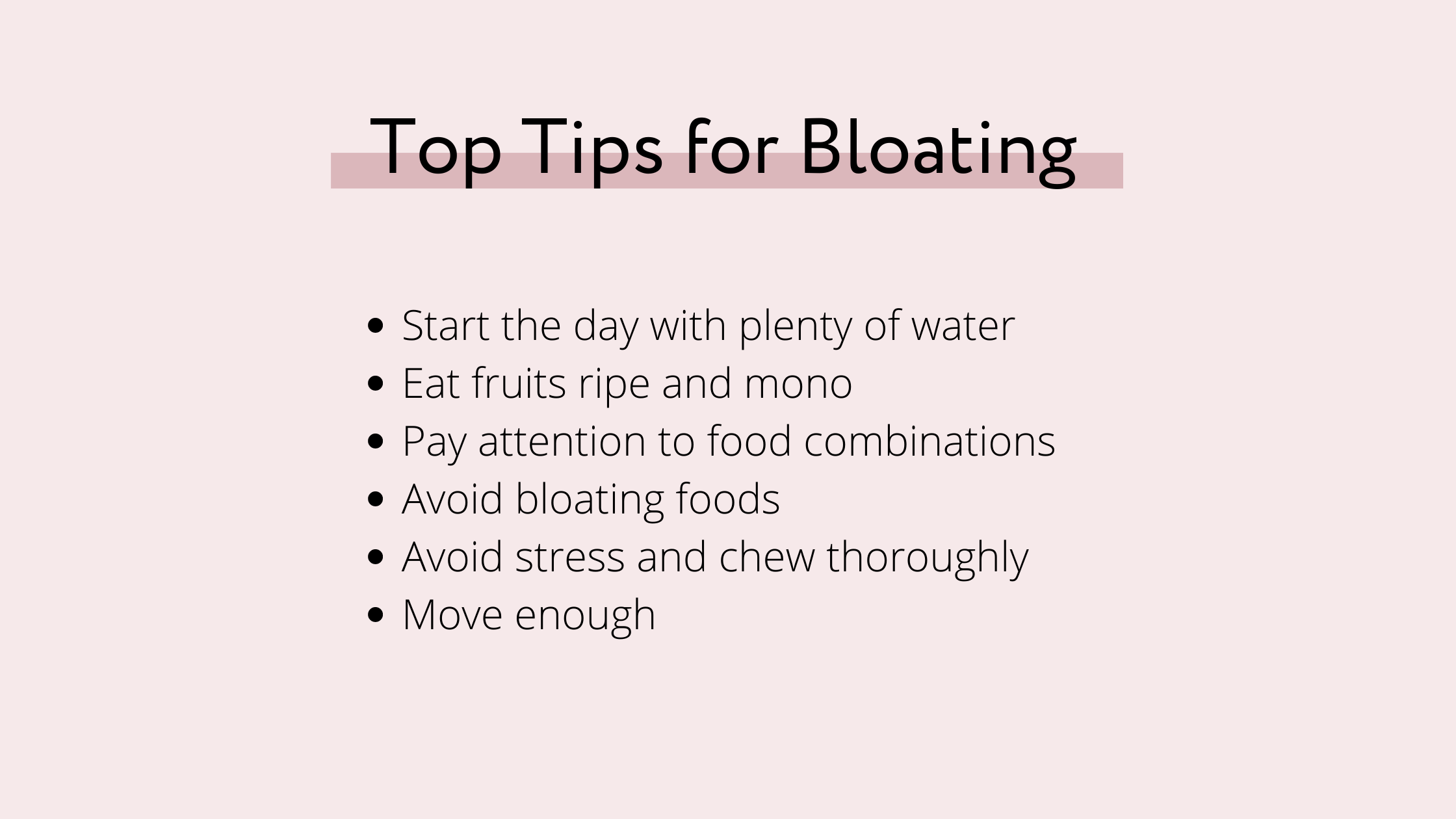A lot of people are affected by bloating when switching to a raw food diet. At the beginning, this is completely normal to a certain extent. But several different circumstances can lead to increased and particularly foul-smelling intestinal gas. Here you can find out what to do about it and why you may experience increased flatulence when switching to a plant-based diet.
Bloating: What’s Normal?
Farting can be unpleasant, and we often try to stifle the escaping air when around other people. Yet intestinal gas is completely normal and a sign of healthy digestion. If you always hold it back, you can get abdominal pain and an uncomfortably bloated belly. So the healthiest thing is to let the air escape from the digestive tract in a relaxed way whenever it’s possible.
Farting 10 to 20 times a day is healthy
With a healthy digestive system, we fart on average 10 to 20 times a day. It’s also normal and healthy for this to cause some unpleasant odors from time to time. Medical experts agree that it’s normal to fart up to 24 times a day and shouldn’t cause any concern. This usually happens more often at specific times, like right after meals. Since digestion is less active at night, we fart less then.
Farting about 10 to 20 times a day is normal and a sign of healthy digestion. Whenever possible, it’s best to let the wind escape in a relaxed manner. If we suppress it permanently, the gas can accumulate, which can lead to abdominal pain and a bloated belly.
How Does Bloating Happen?
Anything that’s clearly above average, is particularly foul-smelling, or happens regularly alongside a bloated belly or even abdominal pain can have various causes and no longer belongs in the realm of normal digestion. At this point it’s worth getting to the bottom of the issue.
Gas forms in the digestive tact
Forming gas in the body is a natural “accompaniment” of healthy digestion. It’s produced in various places in the digestive tract. We actually produce a total of about 2.5 liters of gas per day – mainly consisting of oxygen, nitrogen, carbon dioxide, hydrogen, and methane. We get rid of the majority of this gas through our lungs, but a portion of it, about 0.5 liters, escapes through the intestines during healthy digestion.
1. Esophagus
When we eat, it’s normal to swallow air from our surrounding environment, i.e. oxygen and nitrogen – and the more hastily we eat, the more air we swallow. So, a first tip against excessive flatulence: Eat calmly and slowly, and don’t wolf down your food.
2. Small intestine
During the digestive processes in the small intestine, other gas is produced, mainly in the form of carbon dioxide – for example, during fat digestion and the neutralization of stomach acid.
3. Large intestine (colon)
The large intestine is the place where the majority of microorganisms, mainly bacteria, can be found in the intestine. They do the rest of the digestive work that the body still needs and produce a lot of gas in the process – this includes methane, which smells unpleasant.
-
Meteorism: the typical bloated belly
When air accumulates in the digestive tract but doesn’t escape through the intestines, doctors refer to this as meteorism. Colloquially, we also call this a bloated belly or distended abdomen.
-
Excessive air and strong odor
When we release wind through the intestines more often, this is called flatulence. There are several reasons for this. A “harmless” reason can be a diet that includes eating a particularly large number of hard-to-digest foods, like cabbage, sauerkraut, and beans, or a change in diet to more fresh foods. In this case, the digestive system isn’t quite as accustomed to these foods just yet.
-
Putrefaction and fermentation processes
Another reason can be a really high protein intake. This is especially noticeable in the form of particularly foul-smelling wind. Another reason could be an intolerance of lactose or fructose. In this case, the substances are unable to be absorbed in the small intestine the way they’re supposed to be. They continue on to the large intestine, where intestinal bacteria produce a lot of smelly gas (methane) in an attempt to digest them.
Gas is produced in the esophagus, small intestine, and large intestine, some of which can be noticeable as farts. If this happens frequently or has a strong odor, we refer to this as flatulence. There are various causes for this.
What Are the Causes of Bloating?
There are various reasons for increased gas production. There’s a difference between temporary bloating, which can be a result of eating certain foods, for example, and persistent bloating, which often has a deeper cause that’s mostly found in the digestive tract itself.
Temporary bloating
- Bloating foods like legumes, cabbage, and fermented foods
- Eating too quickly – air is often swallowed when this happens
- Ill-advised food combinations, e.g. cereal with fruit or cereal with milk
- Eating and drinking at the same time
- Carbonated drinks
- Sugar substitutes, e.g. sorbitol, xylitol, erythritol
Persistent bloating
- Food intolerances, e.g. fructose, lactose, histamine or gluten intolerance, like celiac disease or a gluten sensitivity
- Individual intolerances to individual foods
- Chronic inflammatory bowel disease (IBD)
- Irritable bowel syndrome
- Imbalance of the intestinal microbiota
- Intestinal fungi and parasites
- Stress
Imbalance of the intestinal microbiota
One reason for persistent flatulence, which affects more and more people these days, is an imbalance of intestinal bacteria. We have trillions of microorganisms in our intestines, which mainly include bacteria. Depending on how we eat, whether we take medications, if we’re exposed to a lot of stress, or the state of our overall health, their composition looks different.
Antibiotic treatment, a lot of sugar in the diet, and not eating enough fiber can especially disturb the balance in the intestines. This, in turn, disturbs normal digestion and more gas is produced as a result. Antibiotic treatment can be thought of as a veritable forest fire in the intestines.
Intestinal fungi and parasites
Intestinal fungi and parasites can also be a cause of persistent bloating.
Intestinal fungi are mostly yeasts of the Candida albicans genus. These settle particularly as a result of too much stress, heavy metals (amalgam), or combining certain foods that shouldn’t be eaten together. Foods containing sugar and white flour and combined with fats, for example, develop an ideal breeding ground for yeast. This leads to bloating and flatulence because yeasts break down the carbohydrates in the food into carbon dioxide and fuselol.
In the event of parasite infestation, an intestinal cleansing is the best remedy. With an intestinal cleansing, the intestines are freed from old layers of mucus and deposits and thus the popular hiding places of parasites. Combined with an anti-parasite diet, an intestinal cleansing causes the intestinal environment to change in a way that pathogenic intestinal inhabitants no longer feel comfortable. Oregano oil, papaya seeds, or wormwood, for example, all have an antiparasitic effect.
If we avoid over-acidification and residues and ensure a positive acid-base balance with an alkaline-forming diet, this will help create an environment in the body that will appear uninviting to intestinal fungi and parasites.
Stress
In addition to physical causes, psychological factors can also lead to a bloated belly. Anxiety and stress in particular play a central role. Additionally, those affected by this often eat too quickly and thus swallow too much air.
There are around 100 million nerve cells in the abdomen that run through the entire digestive tract. The production of serotonin, the happiness hormone, is also formed up to 90% in the intestine. This means that any emotional information is absorbed in the intestine, processed, and passed on to the brain.
When we’re stressed, our brain sends interference signals in the form of stress stimuli to the gut brain, and the finely tuned system of our gastrointestinal tract gets out of balance. Additionally, stress hormones put our bodies into fight-or-flight mode. Instead of digesting properly, the body now has to focus on other things, like breathing or muscles. The result can be poor digestion and bloating, among other things. To get stress-related digestive problems under control, it’s important to build regular relaxation breaks firmly into everyday life.

Switching to a Plant-Based Diet
Switching to more plant-based foods brings a lot of good things with it. Positive effects, like more energy, better sleep, or less susceptibility to infections, are often noticeable very quickly. That being said, there’s also one side effect when switching to raw foods that can be annoying: increased bloating. Since raw foods in particular are at first challenging for an untrained intestine, this is even more noticeable with an influx of raw content.
Intestinal Bacteria Adapted to Diet
The intestine is a creature of habit. And what’s more, depending on our eating habits, our intestinal bacteria are set up a certain way – and these are partly responsible for digestion. For example, people who eat a lot of meat have more of the bacteria that digest meat, and people who eat a lot of plants have more that digest plants. So increasing plant intake is initially unfamiliar to the body and simply can’t be digested in the most ideal way, at first. This mainly has to do with dietary fiber.
Digestion Gets Accustomed to Dietary Fiber
The good thing, however, is that intestinal bacteria are in a constant state of flux. They adapt to the new diet over time and the kind of bacteria that are needed here for digestion begin to multiply. To relieve flatulence, it’s a good idea to eat extra flatulent foods, like beans, sauerkraut, and cabbage, only in moderation at first, and then most importantly to observe the body’s reactions. It also helps to slowly increase the portion of raw food.
People who incorporate more plant-based foods and raw foods into their diet often notice that they experiences flatulence or even a bloated belly. This is because the intestinal bacteria have to adapt first. Therefore, it makes sense to increase the portion of plant-based and especially raw foods step by step.

What Helps with Bloating?
If you suffer from persistent flatulence, the first thing to do is to get to the bottom of what exactly is causing it.
Keeping a Diet and Symptom Diary
Keeping a diet and symptom diary, where you can record your diet and your symptoms, like flatulence, can help you to get an initial idea, even if you just do it for a few days. You may find links with certain foods, times of day, or other circumstances, like stress or eating fast.
On your own, it can often be difficult to get to the bottom of the matter completely. Professional, experienced nutritionists can help you with this. If you’re not getting anywhere with your diet, and especially if you have other symptoms like blood in your stool or weight loss, then it’s important to consult a gastroenterologist. This could indicate a chronic inflammatory bowel disease like Crohn’s disease or ulcerative colitis.
Holistic measures against bloating
- Sufficient hydration: drink up to one liter of warm water in the morning
- Relaxing while eating (pleasant atmosphere, allow yourself enough time)
- Chewing thoroughly (until mush is formed in the mouth)
- Avoid highly bloating foods like cabbage, beans, sauerkraut
- Use spices that reduce flatulence: caraway, fennel, anise, coriander, cumin, asafoetida (Ayurvedic spice), cardamom, ginger
- Lean towards an alkaline and low-salt diet
- Pay attention to food combinations and observe your body’s reaction
- Eat fruit when ripe and only on an empty stomach
- Don’t drink during meals
- Wait 4 hours between meals
- Intermittent fasting
- Sufficient exercise
Tips for Persistent Bloating During the Transition to Raw Food
Now, it may still be possible to struggle with persistent bloating with a primarily fresh plant-based diet, despite taking into account all the previous tips.
So we give the following recommendations exactly for this problem:
-
Fasting
To get a fresh start, fasting is a very effective way to let the digestive system recover and work more efficiently. By temporarily abstaining from food, we offer our digestive system the opportunity to cleanse and regenerate. This time-out is a blessing for the intestinal mucosa, because it can finally take care of itself, break down waste products, and utilize deposited substances.
Afterwards, it’s very important to break the fast consciously and to confront the intestinal environment with food again in a well-planned way.
-
Food combinations
Those prone to persistent flatulence are well advised to implement food combinations more strictly, observe reactions, and get to know their bodies well.
Basic rules:
- Watery food before dry food
- Easily digestible food before difficult-to-digest food
- Mono-meal before a combined meal
-
Daily routine
It’s useful to start the day with plenty of water, and in the following order:
- 500 ml lemon water or 500-1000 ml warm water
- 500 ml freshly squeezed vegetable juice
- Fruit mono meal or smoothie bowl
Because the liver works throughout the night, starting the day with lemon water is especially beneficial for the liver, and can support it in filtering and eliminating toxins. A wonderful alternative is simply warm water!
Freshly squeezed juices are easy to digest and provide the body with plenty of nutrients. Mono meals are meals that consist of only one type of fruit or vegetable. There are a lot of benefits to this: the digestive system is relieved (because it’s able to focus on only one type of food), short digestion time, ideal use of nutrients, no uncomfortable feeling of fullness, and plenty of energy.
The mono-meal may not be as far-fetched as it seems at first. Imagine how our ancestors would find a richly hung fruit tree while foraging for food and eat until they were full. Most wild animals also eat mono-meals.
A digestion-friendly alternative to a mono-meal is a smoothie bowl; leafy greens and fruits combine well. But that being said, it’s important to avoid seeds or other high-fat ingredients.
The midday meal can be the largest meal, since the digestive fire is the most active from around 12:00 pm to 2:00 pm. This could consist of a large salad or salad bowl, with patties, raw breads, and dips. Try to keep the meal low in salt and fat.
You can find more suggestions >> HERE.
We do not recommend the evening meal to be raw if you’re prone to bloating. Some digestion-friendly options in the evening could be steamed vegetables with quinoa, millet, rice, or potatoes, as well as a vegetable soup.

You are interessted in gaining a comprehensive understanding of the health benefits of a plant-based diet?
Take the opportunity and join our unique, based on nutritional sciences and practice-oriented training program for gaining a high level of health.
We are more than happy to inform you about our training program on our website!




0 Comments